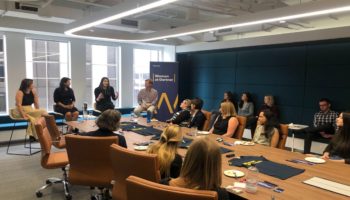Sarah Liu was so struck by the lack of opportunities for Asian-Australians she began her own firm. Now 12 years later she says there is a backlash against diversity, equity and inclusion.
Sarah Liu started her advisory firm to tackle diversity and inclusion more than a decade ago after being frustrated by what she felt was a lack of career opportunities for Asian-Australians.
The Taiwanese-born Australian who was educated in New Zealand and at the University of Tokyo says her multicultural background gave her an insight into the challenges facing “minorities” in corporate Australia.
“I was progressing through corporate Australia but, being very ambitious, was confronted by the lack of opportunities because of the lack of diversity and inclusion in the corporate world,” she said. “So I decided to take it upon myself to try to make a change.”
Ms Liu set up consultancy TDC Global in 2012, focusing on advising companies about how to “attract, retain and advance top talent through leveraging generational, cultural and gender diversity”.
TDC’s clients include companies such as Coca-Cola, Adobe, and online jobs company Indeed.
Founding what she originally called The Dream Consultancy resulted in Ms Liu being named as one of the 40 under 40: Most Influential Asian-Australians in the entrepreneurship category at the Asian-Australian Leadership Summit in 2018.
The entrepreneurship category winner at the time was Airtasker founder and chief executive Tim Fung.
While Australian companies have come a long way over the past decade and many are supporters of diversity, equity and inclusion policies – now known in the human relations business as DEI – Ms Liu is concerned by what she sees as backsliding, lip service and even a private backlash in some sections of corporate Australia.
She believed the backlash against “diversity, equity and inclusion” policies by companies in the was making its way to Australian shores. The rejection here of the referendum on the Indigenous voice to parliament was causing some senior managers to tone down their support for diversity and other social issues.
Commitment to encouraging diversity and inclusion is fairly widespread at the top levels of many large companies in Australia – at least in theory – Ms Liu said.
But Australian companies were easing back on the amount of investment they wanted to put into DEI, such as hiring DEI specialist managers and sponsoring DEI- related development programs.
A recent survey by TDC of 1415 employees and DEI managers in Australia, Hong Kong, Singapore and Japan, showed that Australian companies were less likely than those in the other countries to be thinking about investing more money in DEI.
“It has become clear in the past 12 to 18 months that economic tension has directly impacted companies’ focus and level of spending on DEI-related activities,” she said.
“But we are also seeing the ‘weaponisation’ of DEI. We are seeing the politicisation of it in the US.
“In Australia we are seeing a lot more resistance, either overtly or subtly, to move away from DEI activities.”
Ms Liu believed that the rejection of the Indigenous voice to parliament in 2023’s constitutional amendment vote, despite strong support from major companies such as Qantas, had caused some Australian executives to tone down their public advocacy of DEI.
“What happened after the vote, (in terms of some shareholders criticising companies who backed the voice), has definitely contributed to the sentiment amongst corporate leaders,” she said.
“Corporate leaders are becoming a lot more nervous and calculated when it comes to deciding on whether to make a stance (on social or DEI issues.)”
The backlash against companies with official policies encouraging diversity, equity and inclusion was gathering momentum in some sections of the US in the face of pressure by anti-DEI activists.
Tennessee-based rural retailer Tractor Supply last week announced it was officially cutting out all jobs focused on diversity, equity and inclusion, and was also dropping its carbon emission goals.
It also declared it was dropping its sponsorship of pride festivals for the LGBTQI+ communities.
Major companies like Amazon, Twitter and Nike have announced plans to cut back on five to 16 DEI executives in each of their companies.
Shareholders at major US companies such as GE Aerospace and United Parcel Service have voted on proposals to oppose environmental and social initiatives this year, according to The Wall Street Journal.
The WSJ last week reported that conservative groups in the US were suing companies like Target for their progressive positions while other firms, it said, were “muting their interest as DEI programs come under threat”.
Ms Liu said she was seeing a clear division amongst companies in Australia with some committed to encouraging diversity and inclusion, but others cutting back.
“We are seeing a polarisation of the spend in the market in Australia,” she said.
“There are a large number of companies in Australia which are really advanced in the DEI space and want to go further. At the other end of the spectrum, there are companies which are reducing their investment in the DEI space.
“They are steering away from it, even when it comes to their internal narratives.”
When it came to social issues and human resources practices, Liu said “Australia as a market tends to mirror a lot of what is happening in the US”.
“The backlash in the US may have emboldened some executives and leaders in Australia who didn’t really believe in DEI to begin with,” she said.
“It has given them a platform and more conviction to steer away from it.”
Ms Liu said she was also seeing what she calls “artificial harmony” in Australia, “where leaders on the surface agree with it but, in actual fact, do not support it”.
“What is going on here is less overt and visible, but it is translating into not spending on DEI (programs and executives),” she said.
As a strong supporter of policies to encourage a more diverse workforce Ms Liu said promoting diversity and inclusion policies helped with employee engagement and was also good for attracting customers in Australia – which has a growing population of people born overseas or whose parents are from overseas.
She said that companies which drop the ball on DEI policies in Australia would find themselves falling behind in these areas.
“A third of our population were born outside of Australia. Diversity is in the DNA of Australia,” she said.
“Diversity is a reality and when the leadership at the top level does not reflect the diversity of society, there will be challenges and changes will need to be made.”
Originally published in The Australian







